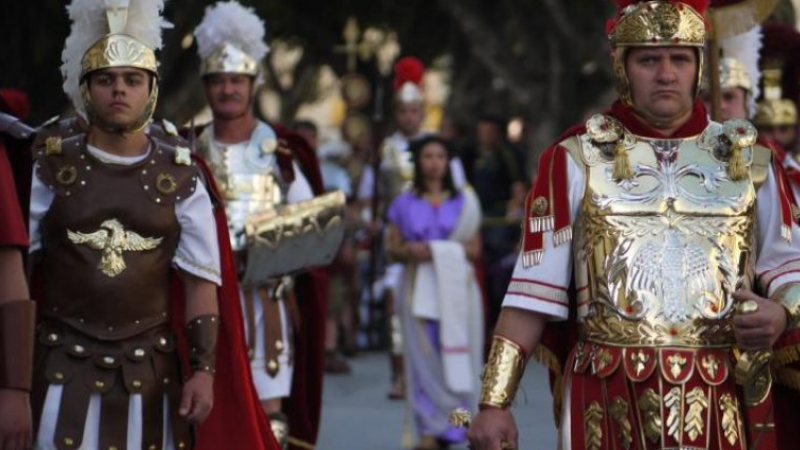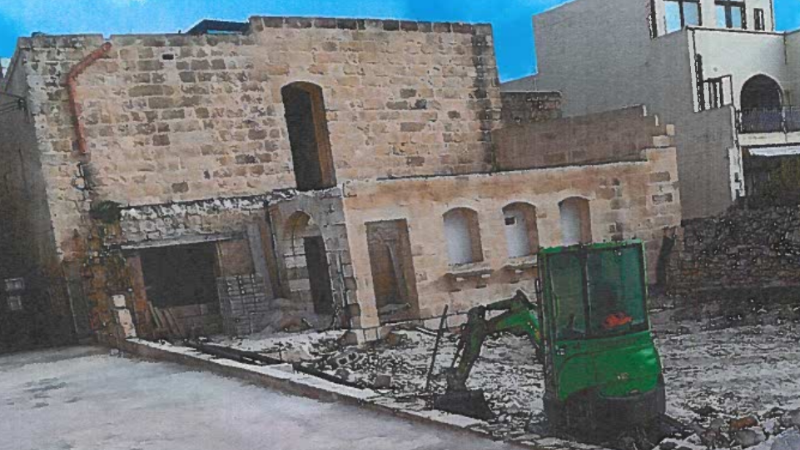I’ll never forget my first Easter in Malta because it started with an utter torment of noise followed by a Roman invasion.
There were three different churches within earshot of my study in Żejtun, each competing like the voices in the street to drown each other out. They chimed all the right hours at the wrong intervals because none of their clocks were in synch.
The thrice-daily angelus sounded like a fistful of coins falling on a pavement. Other bells were sober and sonorous, while some sounded their praise in a frenzy of clanging.
I never minded the bells, even when I had to mute myself on conference calls, or hang up and try again when it was over. They provided a rhythm to the day and reminded me of where I was. But no matter how hard I tried, I could not reconcile myself to the ċuqlajta.
A monotonous wooden clapper that replaced the bells on Good Friday, it thundered from dawn to dark with the penitential insistence of a jackhammer at treble the volume. Only a few very traditional villages still tormented believers, non-believers and small animals with this device, and Żejtun happened to be one of them.
It’s difficult to imagine just how loud two pieces of wood banging together can be until you’ve been hurled out of bed by it. I started the day in a state of tachycardia and spent the rest of it desperately trying to hold a single thought in my head.
The ċuqlajta drove them all out, apart, perhaps, from lamentation: for the acoustics of old stone houses, for my sense of hearing, and finally, for existence itself. Surely the void would be better than this?
I humbly suggest all politicians be made to spend part of their Easter weekend locked in that bell tower while the ċuqlajta is thundering at full volume. Even living a block away, it’ll make you repent sins you didn’t plan to commit.
I did feel awfully good about my life when it stopped, and maybe that’s the point. I’d faced something even more disturbing than petards, but it was over now, and I could go back to reading — to that and a plateful of kwareżimal, my favourite seasonal treat. I like them even better than figolli or Cadbury eggs.
I’d just bitten into a nice chewy biscuit flavoured with almonds and spices when my wife burst in the door to tell me the main square was filled with Roman centurions.
“I realise things change slowly in Żejtun,” I said, “but if Rome still ruled here, I’m pretty sure someone would have noticed.”
Then again, we did see the long-dead Michael Jackson perform at a village festival, so I guess I shouldn’t have been surprised when Ramses the Great shuffled down Triq San Girgor.
Moses wasn’t far behind him, followed by shepherds leading live sheep, and enough Old Testament prophets to severely tax my faded Catholic school memories, inscribed at a time when I spent far more time gazing wistfully at girls in my class than I did listening to a litany of ancient prohibitions.
The rhythmic stomp of marching feet on flagstones heralded the arrival of the Romans. One bore an astonishing resemblance to our local butcher, but perhaps it was just the way he grasped his sword.
He certainly wasn’t smiling. Nor were those villagers who acted scenes from the Passion of Christ. Okay, two girls in Roman togas did giggle a bit when they spotted friends in the crowd, but for most, it was a solemn occasion. Black banners draped the streets, and two marching bands played funeral dirges as participants walked the route in mourning.
The story of Christ’s final hours was told through massive floats carried by eight people who staggered beneath the weight of their responsibilities.
The costumes were wonderful, and a testament to the dedication of participants who invest their own savings and countless hours to make the annual procession a truly unforgettable experience.
Easter is a reminder of sacrifice on many scales: of sacrificing something in the present to reap greater future rewards, and of the ultimate sacrifice of one’s life for another, whether in the story of Christ or in the more immediate story of war or the sacrifices immigrants make to create a better life for their children.
Easter is a time when we’re reminded that the path to salvation — if such a thing can exist for any of us — requires abiding by truth, and if necessary, suffering for that truth. The alternative is the path of short-term gain, and the last nine years have shown us where it leads.
Easter is also a time of renewal, and this is particularly apt as we emerge from a two-year-long pandemic that saw us isolated in our homes, kept away from friends and family, and cut off from any notion of forward progress.
Did you use that time as a period of reflection and reassessment, or did you stew in resentment, lamenting the loss of freedom? Did you lose friends or family members to Covid — a loss made worse by an inability to gather together in mourning and remembrance? What will you do with your life now that it’s no longer on hold?
Finally, Easter is a time of hope. No matter how bad things get — economically, politically, personally — these things will pass. What matters is the values you hold true along the way.













It says a lot about the people dressed in those elaborate and expensive roman costumes. They dress as generals, tribunes and centurions to show power and command even for a few hours.
I remember my first Easter in Malta. We had just been to view ongoing works on our rental that we had been unable to move into (another story). As the garage doors opened, we were greeted by a scene straight out of the Walking Dead. A crowd of (slightly better dressed) Zombies filed past for a good 20 minutes in solemn wailing. It was really quite unreal and we had no choice but to sit and observe in incredulity!!
An enjoyable and thought provoking read. Whilst I love many things about Malta, I never did enjoy the petards which were part & parcel of our festas.
Hehehe, just my type of light hearted yet incisive wit, still gasping for my breath! Really enjoyable piece Ryan and a recommended read for Maltese self criticism from a resident foreigner’s perspective. ☺